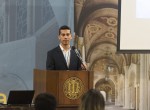As a first-generation college student, Juana Hernandez often struggled to find people she could identify with while studying at UCLA and after starting her career.
“I felt no representation in books, curriculum, classroom. I routinely thought, ‘was this a mistake?’” she said. “The reality is the more you advance through your career, the less and less you see people who are like you or have a path similar to your own.”
Hernandez, who graduated from UCLA in 2009, was a speaker at the First Gen Alumni Network’s inaugural launch event, which the UCLA Alumni Association hosted at the James West Alumni Center on Monday evening. The event featured alumni speakers, a cello performance and time for participants to network with one another.
The First Gen Alumni Network connects alumni and students who were the first in their families to go to college through events like alumni gatherings and send-offs, according to its website.
Cia Ford, senior director of UCLA Alumni Affairs’ Professional School and Affinity Programs, said the event was an opportunity for first-generation UCLA alumni to meet and determine how to better assist current first-generation UCLA students.
“This (was) an alumni get-together, to decide how to support each other and students as well, both professionally and personally,” she said.
Ford said she thinks first-generation college students face more difficulties adjusting to college because they lack guidance from their families.
The first part of the event featured a short video of UCLA alumna Sharron St. John, who talked about her experience as a first-generation student at UCLA.
St. John, who graduated from UCLA in 2012, said being first-generation was difficult because there was a lot she did not understand about navigating college.
“It was gnarly – how are you supposed to figure this out?” she said. “I didn’t know where I was. I didn’t know you could rent a laptop. I didn’t have a cell.”
St. John said handling her finances in college was one of the greatest challenges she faced. At one point, a loan mix-up prevented her from being able to pay her housing fees.
St. John, who now works in real estate, said she thinks first-generation programs offered by UCLA should be more aware of the struggles first-generation college students face, such as professional mentorship, allocating finances and balancing work with academics.
Tatev Papikyan, who graduated from UCLA in 2014, believes that on-campus student organizations can help students adjust to college by providing a support network.
“I very much enjoyed (my experience) because I was very involved,” she said. “Finding a support system (is) the biggest challenge, but also the biggest reward after you find (it).”
Papikyan said she attended the event because she wants to participate in future programs that support first-year students.
“I’m here with an open mind – if they’re planning something great, I want to be a part of it,” she said.
Hernandez, who is now a higher education manager at the Los Angeles Chamber of Commerce, said she fully embraces her identity as a first-generation college student by being open about her background.
“I am a first-generation college student,” she said. “That is my truth and I have to own that.”
